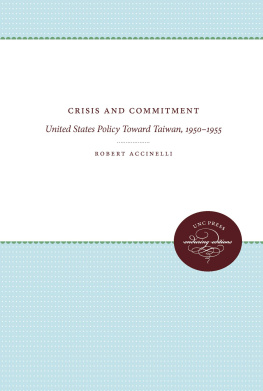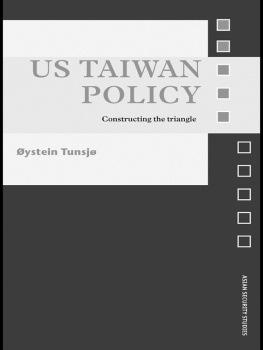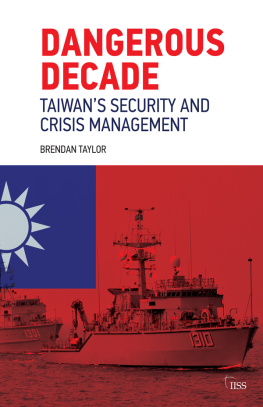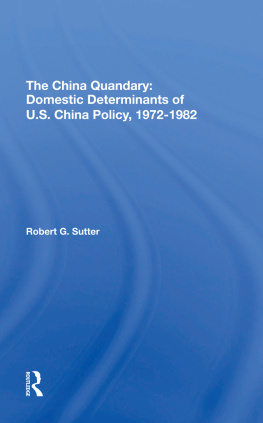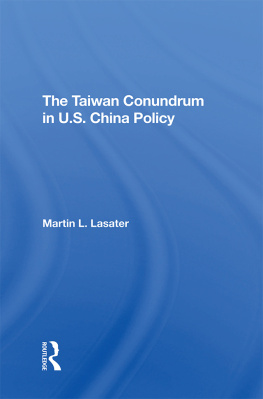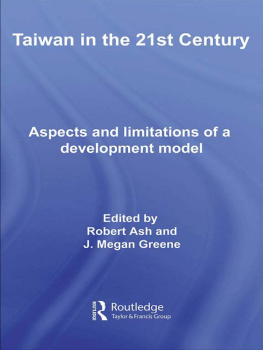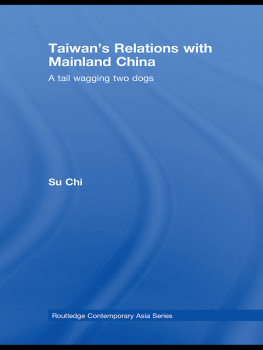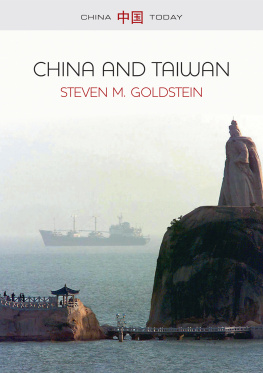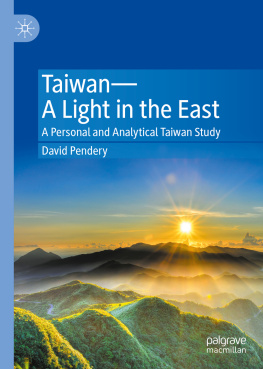1996 The University of North Carolina Press
All rights reserved
Manufactured in the United States of America
The paper in this book meets the guidelines for permanence and durability of the Committee on Production Guidelines for Book Longevity of the Council on Library Resources.
Library of Congress Cataloging-in-Publication Data Accinelli, Robert. Crisis and commitment: United States policy toward Taiwan, 19501955/by Robert Accinelli. p. cm. Includes bibliographical references and index.
ISBN 0-8078-2259-0 (alk. paper) 1. United StatesForeign relationsTaiwan. 2. TaiwanForeign relationsUnited States. I. Title.
E183.8TA33 1996
327.73051249dc20
95-22269 CIP
Portions of appeared previously, in somewhat different form, in Eisenhower, Congress, and the 1954-55 Offshore Islands Crisis, Presidential Studies Quarterly 20 (Spring 1990): 32948, and are reproduced here with permission of the Center for the Study of the Presidency.
00 99 98 97 96 5 4 3 2 1
THIS BOOK WAS DIGITALLY MANUFACTURED.
Preface
Among the proliferation of foreign commitments by the United States during the early cold war, one of the most fateful was to the exiled Chinese Nationalist government on Taiwan (Formosa). The defeated Republic of China (roc), seemingly orphaned by the United States in early 1950 after fleeing from the mainland of China to its island haven, gained a new lease on life as a result of the intervention of the U.S. Seventh Fleet in the Taiwan Strait in June 1950. Subsequently the ROC became first a de facto, then in 1955 a formal, American ally. By extending military protection to Taiwan and once again becoming the patron of the Kuomintang (KMT) regime of Chiang Kai-shek, the United States contributed measurably to the animosity between it and the Peoples Republic of China (PRC) that congealed during this half decade. In 195455, Sino-American differences over Taiwan, which had come to encompass the Nationalist-occupied offshore islands, resulted in one of the most threatening confrontations of the entire cold war.
No issue, not Korea, not Vietnam, divided the United States and China more fundamentally during this period, none was a greater source of contention between them during the remaining years of intense Sino-American rivalry, and none posed a bigger roadblock to their eventual reconciliation and to the normalization of relations in 1979. The United States, despite the severance of formal political and military ties with Taiwan that accompanied the establishment of diplomatic relations with China, has maintained important economic, military, and unofficial connections with its onetime ally. And Taiwan itself has undergone a heralded transition from underdeveloped country to economic dynamo and from an authoritarian state to an emerging democracy. Although the Taiwan issue has been less conspicuous and grating in Sino-American relations since the early 1980s, it still possesses a destabilizing potential. In June 1995 this potential was vividly demonstrated by Pekings white-hot anger over Washingtons decision to permit Taiwans president Lee Teng-hui to make a brief private trip to his alma mater, Cornell University, the first visit by a Taiwanese leader to the United States since the termination of diplomatic relations.
Despite the undeniably far-reaching significance of the political and military commitment to Taiwan molded in Washington between 1950 and 1955, no historian has yet given this pivotal development the comprehensive and detailed consideration it warrants. To this end, I have presented in this volume a full-length analysis of the origins and evolution of the commitment and the attendant unfolding of a reinvigorated relationship with the exiled Nationalist government. Spanning the half decade from the declaration in January 1950 by President Harry S. Truman of a policy of military nonintervention toward Taiwan to the aftermath of the 195455 offshore islands crisis, my study attempts to explain how and why top American decision makers came to reembrace the vanquished Nationalist regime and to transform Taiwan into a pro-American citadel. I have examined the broad sweep of American decision making in its institutional, domestic, and international setting and placed this ongoing process in context with Washingtons evolving relationship with Chiang Kai-sheks displaced government.
My study draws on research in private papers and government documents in the United States, Britain, and Canada. With some exceptions, most notably material on covert activities, essential official American records are now open to scholars. The papers of the Republic of Chinas ambassador to the United States, Dr. V. K. Wellington Koo, at Columbia University, along with Koos exceptionally detailed memoir, provide particularly valuable information and insight relating to Nationalist attitudes and behavior. I make no claim, however, to have written a full or authoritative account of the Nationalist side of the Washington-Taipei relationship, for which historians must await the opening of indispensable archival sources on Taiwan. To interpret Chinese Communist policies, I have integrated into my analysis the findings of western Asian specialists and Chinese historians, whose scholarship in recent years has benefited from the greater availability of official Chinese documentation for this period.
My central theme is that the U.S. commitment to Taiwan emerged piecemeal in the context of crises triggered by the outbreak, of the Korean War, the Chinese military intrusion in the peninsular conflict, and the 195455 encounter with China over the offshore islands. Contrary to the assertions of some historians, I view the North Korean strike across the 38th parallel in the summer of 1950 as a major cause, not merely as the occasion for the interposition of the Seventh Fleet in the Taiwan Strait. The Truman administration, following the reversal of its announced noninterventionist policy toward Taiwan, nonetheless for a time kept an arm s-length relationship with the Nationalist government. It was the crisis precipitated by Chinas surprise entry onto the Korean battlefield that ultimately drove the administration into a fixed defensive posture toward the Kuomintang island bastion and a revitalized political relationship with Chiang Kai-shek and his cohorts. This commitment to Taiwan came to be fused with a hard-line policy of pressure (to use historian Gordon H. Changs apt description) toward China, formalized in NSC 48/5 in May 1951, that aimed at splitting this new Communist giant from its Soviet ally through the reorientation, fragmentation, or replacement of its revolutionary leaders. From this same commitment also sprang an informal quasi commitment to the Nationalist-held coastal islands that contributed significantly to the nearly nine-month face-off with China that erupted in September 1954. Taking issue with Eisenhower revisionists such as Stephen Ambrose and Robert Divine, I find more to criticize than to praise in the Eisenhower administrations handling of this nerve-racking episode. Further, I qualify or challenge conclusions reached by a number of other scholars regarding the administrations calculations during the emergency.
The offshore islands crisis further extended and solidified the commitment to Taiwan by spawning the 1954 mutual security pact with the Nationalist government, the famed Formosa Resolution, and a secret defensive commitment (later withdrawn) to the KMT coastal possessions of Quemoy and Matsu. But the crisis strained, as well as strengthened, the bond between Washington and Taipei and motivated Secretary of State John Foster Dulles to pursue a de facto two-China policy that required a modification of the policy of pressure against the Communist mainland. In the aftermath of the crisis, the Eisenhower administration nevertheless made no attempt to seek reconciliation with Maos China and continued a close, if uneasy, relationship with Chiangs remnant regime.

